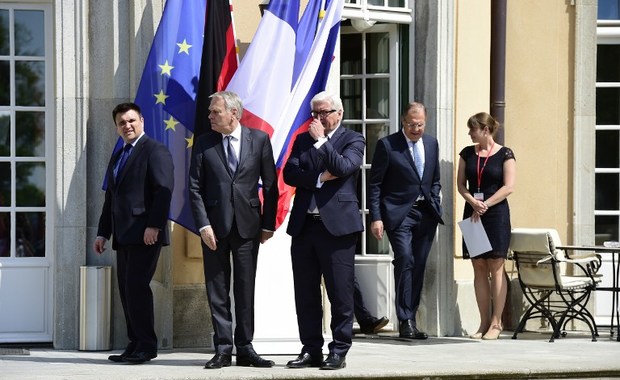
Normandy Meeting Aborts Ukraine’s Proposal on OSCE Police Mission
Publication: Eurasia Daily Monitor Volume: 13 Issue: 99
By:

Russia, Germany, France, and Ukraine held an expanded meeting of their foreign affairs ministers and senior staffs on May 11 in Berlin (the “Normandy” format). Two overlapping issues topped the meeting’s agenda: possible “elections” in the Russian-controlled Donetsk-Luhansk territory, and policing those proposed elections to make them look (against all odds) somewhat believable (Interfax, Auswaertigesamt.de, Ukrinform, May 11, 12).
In this meeting, the Russian, German and French ministers turned down Ukraine’s recent proposal for an armed police mission of the Organization for Security and Cooperation in Europe (OSCE) in the Russian-controlled territory (see EDM, April 20).
The proposed local elections and police mission are partly interrelated issues, but their divergence is more important than their overlap. Ukraine wanted an OSCE police mission to do much more than provide security for possible local elections in Donetsk-Luhansk; but Ukraine lost out in the Berlin meeting.
The Russians, Germans and French, eager in varying degrees to have those elections staged, are asking the OSCE for a mission closely related to such elections. While even a modest mission necessitates complex discussions of principle and detail, it seems clear already that this police mission’s size, equipment, operating mandate, and duration would be confined to the proposed local elections. Thus, if deployed, this police mission would be small and short-lived.
For its part, Ukraine had sought an ambitious OSCE mission of armed police, capable of much more than protecting polling stations and ballot boxes in the event that elections are staged. Ukraine hoped for this mission to substitute, at least in part, for an international peacekeeping contingent in the conflict theater. Russia has blocked discussions on such a contingent at the United Nations for the last two years. And from the start of Russia’s operation in Donbas in March 2014, Germany and others discouraged an already weak-willed European Union from considering a possible EU mission in Ukraine’s east (be it an unarmed contingent as the EU’s Monitoring Mission in Georgia).
Ukraine, therefore, had recently proposed a large OSCE armed police mission with a mandate for full access throughout the Russian-controlled territory in Ukraine’s east, and of potentially long duration. Kyiv hoped for a mission capable of deploying to the contact line between the opposed forces in the field; monitoring the ceasefire; assigning responsibility for the recurrent incidents; verifying the pullback of heavy weaponry (with access to arms stockpiles of the combined Russian and proxy forces); and protecting what is legally the Ukrainian side of the Ukraine-Russia border in the secessionist territory, until the eventual return of Ukrainian border guards at some uncertain future time (see EDM, April 20).
Instead of that, the Normandy group’s Berlin meeting considered a common proposal of the four parties, with technical inputs from the OSCE’s existing Special Monitoring Mission (SMM) in Ukraine. This meant, in practice, aborting Ukraine’s own recent proposal. The Ukrainian side tried hard in the meeting to beef up the mission concepts proposed by the other participants (Ukrinform, May 11, 12).
Russia’s Foreign Affairs Minister Sergei Lavrov rejected the idea of Ukrainian control of provisional OSCE control along that border (see above). Lavrov cited Ukraine’s “obligations” under the Minsk armistice (i.e., consent to “elections” in Donetsk-Luhansk) as a prerequisite to negotiating joint control of that border by Ukrainian and Donetsk-Luhansk personnel (Interfax, UNIAN, May 11, 12; Liga.net, May 16.).
In Donetsk, that “people’s republic’s” head (glava), Aleksandr Zakharchenko, announced that an armed OSCE police mission, as Ukraine had proposed, would be deemed an “act of aggression” (Novosti Donetskoy Narodnoy Respubliki, Dnr-news.com, May 11). Such statements are usually meant to increase the otherwise understandable risk-aversion among the OSCE SMM’s personnel. In this case, it also suggests that any “elections” would be policed on terms set by Moscow and Donetsk-Luhansk separatists; i.e., not reliably policed and insecure.
On the proposed Donetsk-Luhansk “elections,” Lavrov argued that this process forms only one part of a package, which requires Ukraine’s parliament to also enact: a new law on elections, a special status for the Donetsk-Luhansk territories, a constitutional amendment enshrining that status, and an amnesty applying to “insurgents” there. “Until the Verkhona Rada [Ukrainian national parliament] adopts this package, elections are practically impossible,” the Russian foreign minister stated (Interfax, May 11).
This intransigence is misleading, however. Moscow reckons that Berlin, Paris and other capitals want those “elections” to be held as a pseudo-solution to an increasingly vexing problem. Moscow, therefore, hopes that Ukraine’s Western partners would pressure Kyiv to take those steps and make the elections possible on Russia’s terms, complete with that “package.”



